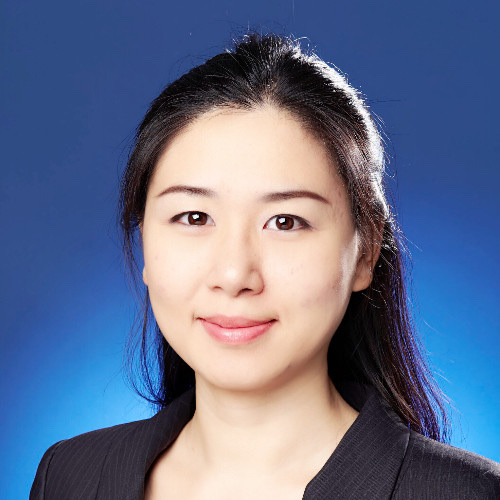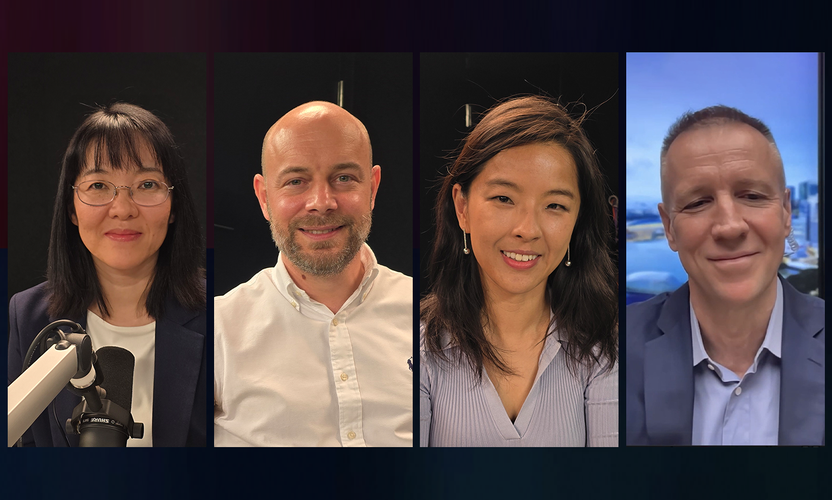This content was correct at the time of publication and is no longer being updated.
In this episode, Catherine Yeung, Investment Director, and Marty Dropkin, Head of Equities, Asia Pacific, are joined by Jarlon Tsang, Managing Partner & Head of China at Eight Roads, and Jackie Chien, Director of Capital Markets.
With additional contributions from portfolio managers Vivian Liu and Dale Nicholls.
Ways to listen:
- Search 'The Investor's Guide to China' on your favourite podcast app
- Click here to listen in iTunes
- Click here to listen to the podcast via the web
- Click here for this and all past episodes of The Investor's Guide to China
Transcript
Catherine Yeung:
Hello and welcome to episode 16 of The Investor's Guide to China. I'm Catherine Yeung, Investment Director at Fidelity International.
Marty Dropkin:
And I'm Marty Dropkin, Head of Equities, Asia Pacific.
Catherine Yeung:
So much of the investment conversation is often dominated by companies that have already gone public. But it's not always just about listed companies, is it, Marty?
Marty Dropkin:
You're absolutely right, Catherine. In fact, investors in private assets, particularly in equities have for many years considered Asia, and especially China, as one of the most exciting markets anywhere. And while there have been challenges and setbacks along the way, the private asset space in Asia and China continues to develop at a really impressive pace.
Catherine Yeung:
In this episode, we'll be speaking to some of Fidelity's investment team who are paying close attention to private markets in the region to find where the real opportunities lie. Plus, we have a special guest who has a huge amount of experience in venture capital investing in China.
Marty Dropkin:
We'll also be looking at private investing across the corporate growth cycle from start-up, to early growth stage, to pre-IPO, and even beyond. What is the right investment strategy for each stage of a company's life cycle? And how do you spot the winners along the way?
Catherine Yeung:
And after a few years of record activity, valuations and deal flows are down quite a bit of late. So how should investors think about the role of private assets in their portfolios at the moment? And what's the best way to balance risk versus reward when it comes to pre-IPO investing?
Marty Dropkin:
So, for our first guest, I'd like to introduce Jarlon Tsang. Jarlon is the Managing Partner and Head of China at our sister company, Eight Roads. He's got over 20 years of experience in the venture capital industry; he's also got over 15 years of investment and operational experience in Silicon Valley and Asia Pacific. Hi, Jarlon.
Jarlon Tsang:
Hi.
Marty Dropkin:
You've been investing in fast growing private companies in China for years. At what stage of growth or in which funding round would you typically come in?
Jarlon Tsang:
Yeah, that's a great question. You know, at Eight Roads, of course we are, you know, a true venture capital firm. You know, we invest at early stage, which in my definition would be anywhere from seed stage to early A fundraising or growth stage in some sense. But it also, of course, depends on which sector we're looking at.
Catherine Yeung:
Jarlon, how has venture capital investing in China developed over the years? And I'm guessing it's become incredibly competitive, is that right?
Jarlon Tsang:
Oh yeah, jeez. You know, look, I think that what's interesting is China has developed, you know, on a pathway that's, you know, very similar to the U.S. And in some ways, you can look at it from a global standpoint in venture capital investing. So if you go in the U.S. today market and you take a look at the venture capital market itself, it is very specialised. You know, you have funds that are focused on new energy. You have funds that are focused specifically on semiconductors and, you know, very focused on biotech. China, you know, if you look back ten years ago, you would have seen what we call, you know, Asia Pacific funds, right? Raised for venture capital. Very opportunistic. A big swath. Then if you go back, you know, maybe it is ten years now already, you're starting to look at China specific funds. And then if you continue to go forward to today, for example, at Eight Roads, we split our teams into health care and tech and we have separate funds for each. So venture is starting to become much more specific and much more deeper in China, which is quite interesting because of the opportunities that we're seeing that allows for that to happen.
Catherine Yeung:
Could these opportunities, though, be derailed somewhat by geopolitical tensions, though?
Jarlon Tsang:
Every year is what I'm saying. I think, of course, the attention recently has been around the Covid zero policies, the U.S., China tensions and etcetera. But I think if you go even back in time, we've always had this, the Asian financial crisis, the, you know, the Lehman, you know, collapse. This is a very global world. So anything that happens globally will have impact in the ventures market. The good thing is that it doesn't react quickly. It's definitely an impact that you see coming and then you have time to adjust. You have time to work with your companies, right? To follow what's happening in the macro. That trickles down to the venture stage investing but we see it coming. So in the public markets it may happen much quicker and then we're able to draw back and say, okay, look, valuations are coming down in the public markets, but it may not immediately impact the valuations in the venture market, but that will eventually happen if the public markets stay down, as we have seen in the, you know, recent 12, 18 months. Right? That has definitely now impacted the venture markets in China which is great. You know, and some people say to us, well, Jarlon, is that a worry for you in China? Well, in the China venture market, the way we see it is, that's a great opportunity for us to invest, right? Because valuations before, because of how competitive it was, was extremely hard for us to fight for deals, right? There were six or seven term sheets coming in.
Marty Dropkin:
Yeah, I totally agree on the valuation side, it's really interesting, Jarlon. And when you think about the balance between how much dry powder there is, how much money venture capital firms like yourselves have on the sidelines, but then thinking about how public markets have reacted. I bet it's creating just such an interesting environment to invest in right now.
Jarlon Tsang:
Absolutely. You know, for the last five years, I think every year was a record of how much, you know, private money or private equity money has been raised for venture funds, private equity funds for China at all stages. You couple on to that, you know, the amount of what we call BAT money or Baidu, Alibaba and Tencent money, that was also being poured into innovation in the venture space. And then on top of that, you pour in, you know, government subsidies, support and etcetera. That's a mountain of money developing and supporting entrepreneurs for growth, which is great for the ecosystem, but, you know, very tough on valuations. This year is a very different year. We're seeing a big pullback not only on the BAT side, of course, you know, because they have their own problems that they're working through. But also in addition to that, you know, private funds out there fund raising are having a very difficult time, expectedly so in the sense that a lot of the traditional institutional investors are quite nervous at this moment in time.
Catherine Yeung:
Jarlon, the point you made about the BAT companies, so Baidu, Alibaba, and Tencent. It once again highlights for me just the huge opportunity set that investors can find outside those names that a lot of people are so, so familiar with anyway. And also from both the public market perspective as well as a private market point of view.
Marty Dropkin:
That's right, Catherine. And I had a conversation earlier with Vivian Liu, a London-based Multi-Asset Portfolio Manager on private markets. And we touched on that, we touched on how we use private markets in the construction of a portfolio.
Marty Dropkin:
Hi, Vivian.
Vivian Liu:
Hi, Marty.
Marty Dropkin:
As a Multi-Asset Fund Manager, you're investing across both equity and fixed income. And you're looking mostly private assets, although the funds I know invest across both public and private assets. How do you look to incorporate private investments into the overall ecosystem of the portfolio?
Vivian Liu:
From the exposure perspective, investing into private assets captured opportunity that what you won't be able to do so through public investments because many companies are staying private for longer. And also we're seeing innovations, interruptions happening in companies that are early stage when they're not really public.
Marty Dropkin:
What are the considerations then, both on the positive and negative side, that we should pay close attention to when you're building exposure to private investments in China?
Vivian Liu:
First one is the knowledge. Investing in China does require you partner with managers with strong local knowledge and capability. They also need to consider the direction of government policies, the role of regulatory risks which are playing a increasingly more so important role into the underlying investments. On the policy front, I think a significant recent development included governments dual circulation strategies and push for carbon neutrality are actually driving profound transformations in China's economy as well as investment opportunities. The last one, I think it is important to understand what is the risk-adjusted returns you are targeting. A good understanding of the underlying risk associated with your investment is the real risk and not the perceived risk that you need to pay attention to and set the sensible expected returns.
Marty Dropkin:
I'm curious, you know, if there's any other trends you're seeing in the private equity markets versus the private equity markets, and how you might differentiate between those in the portfolio?
Vivian Liu:
So, over the last 30 years, the opportunity within private equity side has been very much growth driven. We've seen investors are moving away from early-stage venture and growth investment and started looking at buyout investment where the underlying managers and fund investors have a little bit more control. When it comes to credit side, historically, it has been a very small part of the market within private investment in China, but we're seeing growing set of opportunities in credit. This is driven by, first of all, the structural change, including the improvement in transparency as well as a bankruptcy reforms. Secondly, China's banking system evolved to include more flexible private financing throughout the capital structure. Also, we've seen the desire to partner with international capitals with more knowledge and expertise in this space from underlying business managers. So currently the China non-banking credit stands about 20% versus 60-70% for the US market. So there is a potential upside and especially opportunities in small mid-cap companies with healthy business balance sheet, which has been historically overlooked by the Chinese banks.
Marty Dropkin:
Vivian, thank you so much.
Vivian Liu:
You're very welcome.
Catherine Yeung:
So, Marty, I'm wondering whether we will continue to see a further shift asset allocation wise towards private assets?
Marty Dropkin:
Yeah, I mean, I think if we listen to Vivian and her focus on various sectors and themes, it does sound that way, doesn't it? I think we could very well see further interest in the space.
Catherine Yeung:
Definitely. So, Jarlon, we heard Vivian talk about some of the few important considerations when including private assets into a multi-asset portfolio. Now with your focus on growth stage equity investments in China, what kind of diversification do you actually see across the portfolio of companies you invest in? And really importantly, how do you differentiate in terms of risk-return profile?
Jarlon Tsang:
That's a great question. You know, especially in a changing world I think right now, you know, when we look at our portfolio construction, we are looking for areas where the policies itself are encouraging that, you know, that sector. So right now, for example, in the healthcare space, we're very keen to look at therapeutics, the development of innovation in that space and China is actually rapidly and we see for the next five years hopefully an area of quite good development. I think another area is the policy is all around, ‘hey, we need to be self-sufficient’. We need to have our own innovations, we can't be dependent upon, you know, the US for certain high-tech capabilities. So, semiconductors is another space that's quite interesting right now and rapid development in trying to catch up in some ways. That's just two examples of kind of the way we construct our portfolio in the sense that, you know, we're looking at areas where it's not cutting against the grain, but really kind of going with the winds of the policies. Now, but they have to be in areas where we see high demand, where we think that there's a big enough TAM, or total addressable market in our parlance, which will give us the growth rate that we're looking for. I think the way I look at venture capital sometimes quite interesting, the homeruns we get are always, one, it's a huge growth company, meaning it grows really well, and two, we buy at very cheap, right? A-plus investment. But you're never going to get that typically, and in the past five years, especially when the valuations were high, it was always like, okay, we just want to get into the deal, the valuation we think is high, but hey, the growth rate might be there. Well, the world has changed now, right? The growth rate may not be there anymore. And so if you're talking about investing in, for us at least, in companies that already have revenues or already have a business plan, well, the next two years might be a little rocky for them, their growth rate may not be what we wanted to or expected it to be. So therefore, if you're moving earlier stage and into more innovative stuff, you're kind of using those two years for R&D, developing a new technology, developing a new science, right? And so therefore, that's not going to be interrupted so much by the overall macro versus, you know, they're going to take that time, but you're getting it at a very good valuation. So either you're playing valuation or you're playing growth, it'd be great if we get both. And so wrapping back that up is right now I think we're looking for good valuation maybe in areas that are not dependent upon spending or macro or, you know, because we're worried that the growth rate may not be there at this period of time.
Catherine Yeung:
Has policy ever been too much of a risk for you, though, or do you foresee some surprise policies ruining your thesis in a sector or particular company?
Jarlon Tsang:
We love risk. Maybe that's the answer. You know, look, we absolutely care about policy. And if you've been an investor in China for this long, policy is constant, right? It's always a changing thing and there's no notification. It just hits you. And we're used to that. Now, you know, does that impact us? Absolutely. But in a sense, we are in the risk investing business and a lot of alternative assets is in that type of business. Now, it's just a matter of, you know, how much risk do you feel comfortable with and how much you don't, right, so later stage investing or different types of fixed asset investing, etcetera, is, you know, you're balancing the return of that risk. Of course, venture capital, we’re at the highest type of risk, you've got science risk, you’ve got technology risk, you've got macro growth, regulatory governance. Throw it all in there, right? And that's why I'm saying I love risk, because risk also gives opportunity in my mindset, right? And so because of change and shifts of government perspectives, of policies, it either the wind is blowing with you or in some ways it could kill an existing industry that exists and give you opportunities of something else coming and blossoming.
Catherine Yeung:
And Marty, we work with another portfolio manager who's finding ample opportunities when it comes to private companies. I caught up with Dale Nicholls, who's currently in Singapore, about the opportunity set he's finding.
Catherine Yeung:
Dale, not all portfolio managers invest in private firms, but you hold a couple of really big unlisted names. The first one being Bytedance, the owner of one of the world's most downloaded apps, TikTok or Douyin in mainland China. Tell us more about what made you invest.
Dale Nicholls:
Well, Catherine, if I open up TikTok now, I'm seeing Keanu Reeves doing some dance moves. That's moved on to a guy that’s somehow eating a Nutella jar, as in, the whole jar. So, I hope that just gives you some sense of the diversity of content that people upload. And, you know, to be honest, this type of engagement is what was a key factor in us, you know, wanting to make this investment in this company. And its engagement, not just in the people viewing, but, you know, you've got significant levels of people actually contributing content. So, there's true engagement with the user base. And that user base has really grown significantly. You know, you're approaching 3 billion users globally. What's interesting is that obviously, you know, it started off in China, but now you've got actually more users overseas than in China. So, it's just that level of engagement was a key factor and that's fed into the growth that you've seen. You know, if you look at the numbers, ByteDance is really one of the fastest growing companies in history if you look at the way it's grown and it's actually continuing. So, these are some of the key factors that led us to make that investment back in 2018.
Catherine Yeung:
So, it's interesting, Dale, because what does this really tell us about private companies that have gotten this big like ByteDance without going public? Are there advantages, therefore, in staying unlisted?
Dale Nicholls:
There are advantages. You know, obviously, you don't have that short term focus that there can be for a listed company going through those quarterly earnings. But, you know, I think over time, the companies do want to be listed companies. They want to, you know, have liquidity for their employees. I think it's a natural step for companies to make over time. But, you know, it's a good funding environment for companies that are really delivering well. So, there's you know, there's not that pressure that there may have been to go public early that there was in the past.
Catherine Yeung:
And there's another private company you've invested in called Pony.AI. Can you tell us about your journey with this Chinese autonomous vehicle tech company?
Dale Nicholls:
Yeah, we've as a team focused on the autonomous driving space for some time. Obviously, this is going to be a huge, you know, shift over time. It's, you know, it's a change that is coming. We know it's coming. So, we've really been focused on the space and we got to a stage where, you know, we, I think we reached conviction that Pony really is going to be the leader in China. And, you know, once we got that conviction, you know, it's going to be a long path but obviously the market is just getting started. But, you know, through that conviction, we decided to make the bet on Pony and they’re delivering well. They're actually out there operating, there are driverless cars, services operating in China now. So, you know, we're just sort of at the beginning now.
Catherine Yeung:
You mentioned convictions, Dale, but what about valuations? I mean, I know you look very closely at, you know, what a company's worth and what the market or, you know, it's kind of telling us something is worth. So, taking ByteDance and Pony and other companies you're looking at, are you concerned about where valuations have been or where they could go?
Dale Nicholls:
Yeah, I think it's probably fair to say that private markets in general haven't adjusted as much as public markets, but at the end of the day, it really comes down to the company and their execution. And, you know, the way these companies are executing, I think, you know, the valuations, the levels that they've been able to raise at really do reflect the true value that they're creating in their businesses.
Catherine Yeung:
And Dale, a final question. When it comes to engagement or getting your voice heard as a shareholder in these unlisted Chinese companies, so, for example, ESG issues or even more procedural matters, it would normally come up in a typical shareholders meeting. How different or similar is it to engaging with, let's say, the publicly listed firms?
Dale Nicholls:
Yeah, I would say I mean, we engage at least as much, you know, with the private companies as the public ones in general. And I'm not sure if that reflects, you know, the fact that it's generally a smaller shareholder base. But yeah, we definitely work really closely with the management teams and engage with them regularly. So yeah, I feel pretty good about the relationships and the levels of engagement we have with the management teams.
Catherine Yeung:
Dale, thanks so much for joining us.
Dale Nicholls:
Thanks, Catherine.
Marty Dropkin:
Well, Catherine, that was so interesting what Dale had to say about the breadth of opportunities that are out there in the private market space and then particularly on valuations and how it links to sustainability. What I'm picking up is almost a new part of the ecosystem, you know, when we thought about things before, we look at how fixed income valuations compare to equities, we talk about how one leads the other, but we're looking more and more at how, say, tying into what Jarlon was talking about, about venture capital, thinking about what Dale discussed around pre-IPO investments, we've got all of these different sub asset classes, if you will, that we can kind of look at how they're interacting with each other, don't we?
Catherine Yeung:
Oh, absolutely, Marty. It's not as if Dale doesn't find opportunities across the market cap from a universe perspective, but I kid you not, his face certainly lights up when he does find these private asset opportunities. And of course, Jackie is here with us, and she knows exactly how his face often lights up. Jackie, good to see you again. How are you?
Jackie Chien:
Great. Great. Nice to see you.
Catherine Yeung:
So, of course, Jackie Chien is our Hong Kong based Director of Capital Markets.
Marty Dropkin:
Hi, Jackie. So Dale just gave us some great insight on a portfolio manager’s view on investing in unlisted companies. But in your capital markets role, you might get a more firm-wide perspective on things. Can you give us a little background on the trends that we're seeing in the Chinese private markets?
Jackie Chien:
Sure, definitely. We've seen a huge inflow of deals in the China private equity sector. I think in 2021, last year was one of the busiest years with record number of deals and fund raising that's done by companies. However, things have slowed down this year just due to market volatility, inflationary environment, etcetera. So companies that have good healthy balance sheet with cash are just waiting for the right time to raise additional cash. So these kind of companies, they're not in a hurry. They're slowing down, they're looking at the right valuations because, you know, Jarlon talked about valuation earlier and definitely we've seen valuations have come down. So for some of the companies, they don't want to have a down round. So therefore, they're just waiting. As investors as well, we're looking for the right opportunities, you know, companies with TAM, with growth, who are leaders in their industry. For us and other investors are also just becoming a lot more selective just with the number of opportunities are a bit less. But also you're looking for companies that really could sustain this period before investing in them.
Catherine Yeung:
So Jarlon, somewhat treading the market is what Jackie's describing. Would you tend to agree this is the impact for you?
Jarlon Tsang:
Yeah, no, actually this is, it's fascinating to hear, you know, what Jackie just said. In fact, you know, to me, it triggers something in my mind, which is if you actually look at it, because later stage investors and, you know, large private equity funds are delaying waiting, you know, for the macros to change before making investments. That's creating a vacuum in a sense, right? Where from my perspective, at the venture level, we're looking at our exits and in the past where, you know, we get our stuff done, the company grows very well and then when it gets to a certain stage, it goes to these large private equity firms. It goes to, you know, Dale’s group to be able to fund these companies for the next stage, to be able to then eventually get to an IPO or a sale. But that's not happening very fast anymore. So what it really means is that, you know, for us it's extending our exit period. And for our private companies, what's worse is that, you know, they can't raise money for a period of time. Therefore, they themselves have to either reassess where their valuations are at that moment. And that might be difficult because there's, you know, a lot of negative pressure against doing a down round. But you’ve got to think about it, the public markets have come down sometimes 30, 40, 50%. So how can the private markets, you know, valuations stay where they are? Of course, there's many, many very interesting ways and solutions that could be a primary, you know, secondary, you know, coupling so you could blend down that valuation and not trigger a down round. I think, but a lot of the entrepreneurs will really need to be able to look in the mirror, right, and say to themselves, ‘is it more important to be able to hold on to these valuations that were raised at a different time?’. Or more importantly, ‘let's get some more capital in the door’. Right? And be able to weather this period of time that the larger investors, the private equity investors, are waiting. And so that, you know, when the market normalises again, they can get back to business, but yet still grow during this period of time.
Marty Dropkin:
So, Jackie, I think what we've done now is we've covered the ecosystem from early stage to mid-stage to late stage. I guess a question for you: as companies get closer to that IPO stage, how does that differ and what are the channels for investing there?
Jackie Chien:
Yes, so actually, advantage for an investor like us where, you know, we become a crossover investor, so we will invest in the pre-IPO round and then again in the IPO round, is that, you know, we have the ability to do that versus the PE funds. So a lot of times we do, you know, work with companies in the sense that if it's a company we really believe in where, you know, we are investing in them early, we will support them also at the time of the IPO by being a cornerstone investor. Being a cornerstone investor means our name is in the prospectus, everyone gets to see it before the book is open, that Fidelity is an investor in this company. It's a stamp of approval. So I think we have definitely this advantage when we are trying to compete with some of the other investors when we are trying to invest in pre-IPO, so companies would definitely consider us because they hope that we can support them in the IPO and also continue to hold the shares post-IPO. And I think this is where we differ a lot versus private equity firms. You know, they will invest in a company, but after the IPO, they're looking to exit. Versus, for Fidelity, we might look to add a lot more positions because it could be one fund that invests at the pre-IPO stage but when its IPO, there could be a multitude of funds that are coming. So, our holding will continue to grow with the company post-IPO.
Catherine Yeung:
Jarlon, what about the corporate landscape? Are we seeing more companies which are founder-led or indeed second-generation family companies coming into the frame?
Jarlon Tsang:
I still think it's more founder-led in my mind. Now, where those founders come from is the interesting question. You know, you've got founders coming out of, you know, big MNCs, the BATs that we talked about earlier, is a huge area of entrepreneurship flowing out of that. However, interestingly, over the last six months or so, definitely the deal flow has slowed down because I think a lot of entrepreneurs don't want to jump at this stage. They want security, they want, you know, maybe the security of being at a, you know, bigger company at the stage, right? Now, you know, some family-led companies and etcetera. We're starting to see that happening also. I mean, there are companies that, you know, have been around for a lot longer period of time. The younger generation is starting to take over, they may have a different mindset. You know, we have certain businesses that are traditional healthcare services businesses where the second-generation might want to lead it online versus offline. Right. So that’s quite interesting to see.
Catherine Yeung:
A question for both of you. Are we going to see, you know, the next round of Facebook’s, Alibaba’s, in terms of, you know, that big attention on these names? Or given the environment that you've both been describing, are those times over?
Jarlon Tsang:
I hope they're not over.
Catherine Yeung:
I hope so too.
Jarlon Tsang:
You know, I think that what we're really seeing, what's really interesting to me is that, you know, if you're looking at these companies like the BATs and etcetera, and, you know, there's a lot of press, a lot of news around, wow, you know, the government in China is really cracking down on, you know, be it privacy or data security or even certain licenses around fintech. Right, okay? But in reality, that's happening globally. Look at all of the antitrust issues that are happening with Google, with Apple, right? Not only in the EU but also in the United States. This is not only a China problem, meaning big tech is getting so big, right, that there's a certain point that it's trust busting, right? It's coming in and saying, ‘hey, look, you know, you're too big. You're into every single piece. Maybe these certain areas need to be regulated. Maybe these certain areas you shouldn't be in’. Right? And I think that's a healthy development. What it also gives is an opportunity for newer companies, right, which have, you know, may be more efficient, more effective at it in a certain industry, let's say in fintech or let's say in cybersecurity or let's say in cloud applications, right? To start to develop or spin out of these companies, which will give us even more companies to invest in.
Jackie Chien:
I definitely agree. For investing in China, there's definitely going to be regulatory headwinds. And as investors, you need to look at potentially where the policy encourages, you know, which new sectors are coming up. So for example, electronic vehicles, there is a new focus within sustainability, within renewables in China. So this is a new sector where there will be many opportunities or new opportunities and you could see giants forming in these sectors. So for example, Dale mentioned his investment in Pony and this is a result of these new sectors coming in. So you might see the tech giants facing challenges but there will be other new opportunities and new unicorns forming.
Catherine Yeung:
Okay, Jarlon, so final question for you. We've been on an amazing journey so far, but would you suggest the next generation that this journey will continue?
Jarlon Tsang:
Absolutely. I hope it continues, I think it's going to be even more exciting, to be honest. Just like what Jackie has just said, you know, you have carbon neutrality becoming a big issue and, you know, a lot of software that has to be around that. There's always something new. That's the beauty of this industry, and I just feel that it's just the game changes itself, right? The rules might change a little, but innovation's always going to happen and that's always going to lead to, you know, people wanting to create wonderful companies that eventually will hopefully create a new sense of something new that you haven't expected to see, right? You know, we talked about Pony a lot today. You know, that is something where one day now, it becomes much more of a reality, you won't be driving anymore. Isn't that cool? To me, it is.
Catherine Yeung:
Well, especially my driving skills. Yes.
Marty Dropkin:
Jackie, how about you?
Jackie Chien:
From my perspective, that definitely rings true. We are seeing tons of innovation within China. Other than the sectors that we talked about, there's a huge focus on biotech as well, you know, developing their own medicines rather than relying on imports. So I think, you know, we will definitely see new opportunities within many sectors in China and it will be an area of continuing investment for, you know, the global investor world.
Catherine Yeung:
Absolutely right. And, you know, Marty, what I also think is fascinating is that doing research and meeting companies in the private space can also add to our overarching views on sectors or industries where companies that we invested, you know, obviously from a listed perspective. So it makes a lot of sense to have this broad exposure, wouldn't you say?
Marty Dropkin:
Yeah, definitely that. And I'll tell you what I take away from this really wide ranging and I think maybe one of the most interesting discussions we've had, Catherine, on the podcast series is just the development of the ecosystem. I know I talked about this a little bit earlier, but when you think about Jarlon's focus on early stage companies, what Jackie discussed on the pre-IPO stage, what we already do, you know, so, so fluidly in the public markets, it's just showing how the whole ecosystem fits together and meshes together and I think the wide ranging discussion on valuations as well, it's just a fascinating place. And, you know, markets are going to have cycles, they're going to kind of go up and down, and we've discussed, you know, sectors that are coming in and out of favour. It just brings to light so many pertinent topics today, doesn't it?
Catherine Yeung:
Exactly. And I love what Jarlon said about time is on your side in this area. I never associated time with private investing, but yes, definitely true.
Marty Dropkin:
Yeah, absolutely. And I think his comments on, you know, the length of lockup periods and the length of holding for venture capital companies, is just bringing so much new, new emphasis on the space. Really interesting, really interesting discussion today.
Marty Dropkin:
So, Catherine, that brings us to the end of this episode. A huge thank you to our guests, Jarlon Tsang and Jackie Chien. And to our other contributors today, Vivian Liu and Dale Nicholls.
Catherine Yeung:
And thank you for listening. If you want to read more of what's been covered today, please go to your local Fidelity website or fidelityinternartional.com. The producers were Rory Fong and Neil Gough with production support from Seb Morton-Clark, Tommy Su, Keith Chuen, and Kim Joo Koh. The editor is Richard Edgar.
Marty Dropkin:
And until next time, from all of us at Fidelity, goodbye.
Catherine Yeung:
Goodbye.














































